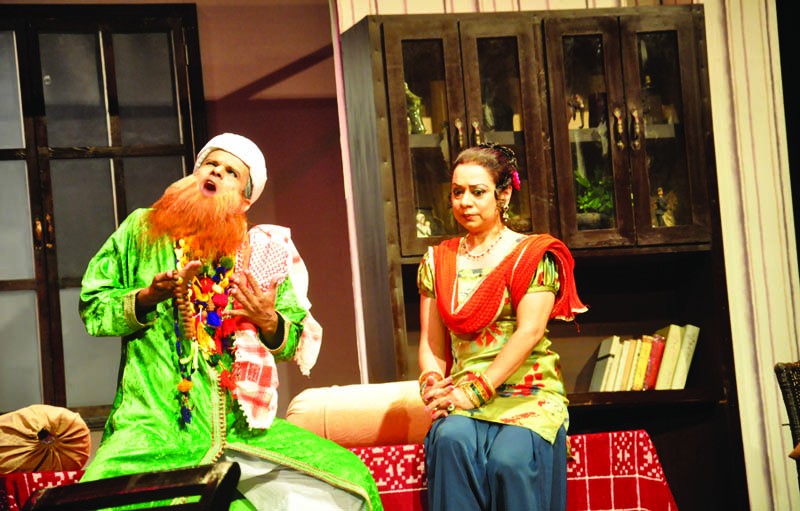
Napa play Baba Jalinoos is worth a watch in its scathing portrayal of religious hypocrisy presented in the format of traditional farce and comedy

Holier-than-thou religious fervour never seems to go out of fashion. Tartuffe, Moliere’s 17th century French satire on religious hypocrisy and gullibility may look strikingly familiar to our audience as Baba Jalinoos. The play is well adapted by Khalid Ahmed, who has also flawlessly tailored it to fit our socio-political backdrop.
Directed by Fawad Khan, a teacher at National Academy of Performing Arts (Napa), and played by a bunch of Napa graduates, this cautionary tale flagrantly exposes the religious bigotry and duplicity rampant around us.
Baba Jaalinoos (or Tartuffe) is centred on a charismatic charlatan and a would-be man of God, who is more in thrall to sex and money than any of the liberals he routinely chastises. The play is equally about his gullible follower, Azam, who is blindsided in his admiration for the religious faker to see the brazen truth about his deceit.
It doesn’t end here. He moves the impostor in, promises his daughter to him and signs all his possessions in the name of Baba Jalinoos. Dare anyone think differently -- he fulminates against those who do not share his sainted view.
The play has no room for subtlety. Fawad Khan, the director, believes in tickling the audience with a sledgehammer of slapstick instead of a feather of wit. And do I need to mention that he gets his due share of laughs!
The play, however, opens rather slow -- with a long and wordy sermon by Saalay Sahab who gets too worked up on Azam’s (Farhan Alam Siddiqui) insane likeness for Baba (Zaki Ullah Khan). Perhaps, it was done to give a comprehensive insight to the play and avoid leaving anything to audience’s imagination.
The play catches up on the intended energy and engrosses the audience in the enthralling comedy soon after the first act, and eventually gets hotwired by the brazenly insubordinate Marjeena (Muzaina Malik), who brings a lively sense of wit and mischief as the smart-mouthed maid. The virtuosic ease in delivering her dialogues and artistic elaborations in her expressions truly calls for a round of applause. However, it would have made it more real if she had shown even the slightest hint of restraint.
Mariam (Erum Bashir), the archetypal beauty, is one of the characters who picks up tremendously during the span of the play. Initially, she suffers from the tragic sexism in her portrayal as a comprehensive idiot, with limbs akimbo and batting eyelashes. It gets better as her character develops into a more well rounded one after Marjeena’s wake up calls that lead her to break free from the shackles of restraint and so-called shame. Her charm is duly unveiled during the dust-up with her displaced heartthrob, Waleed, which is as sweet and alluring as a lovers’ quarrel should be.
Waleed’s (Kaleem Ghori) shockingly flashy appearance not only reminds you of Amitabh Bachchan from 1970s but also shows a contrast between the exterior and the real. When he finds out that Azam is planning to give Mariam to Baba Jalinoos, he throws a fit and slams open the door to engage in a hopeless yet adorable argument with Mariam.
Some dialogues are truly demonstrative of how society blows up harmless details; one is when Azam tries to put his daughter off Waleed, he says, "Main ne usay kebab khatay dekha tha, yaqeenan sharaab bhi peeta hoga".
One of the characters that the audience would find closest to today is Danish (Hasan Raza), who appears desperate to display his manliness at every opportunity. His obsessive bent on using physical force appears ironic and suggests a violent streak, and lack of tolerance that sadly runs in our generation.
The real farce begins when Danish catches Baba Jalinoos in an act of adulterous seduction and tells his father to wake up from disillusionment. But somehow Azam sees things differently and throws his son in the maws of a fraud who’s precisely aware of the overwhelming control he has over him.
The play’s comic high spot is the famous scene in which Alvina (Mehwish Farooqui), Azam’s wife hides him under a table and waits -- and waits and waits -- for him to interrupt Baba’s increasingly insistent indiscretions. Mehwish looks lovely in a flashy short shirt fitted to the last inch, her style reminiscent of the decade the play is set in. It’s her satin fabric Baba Jalinoos pretends to admire as an excuse for putting his hand on her knee.
The play has its full share of explicitness and bold moves to add the juice and take the audience by surprise. The script also goes extremely suggestive, especially in Baba Jalinoos’s dialogues. The final blow of boldness is when Baba Jalinoos tears off his shalwar and sprawls out of his humble rags revealing the star-tucked superman undies in utter shamelessness.
Hats off to Zaki Ullah Khan, a third year Napa student and Fawad Khan, the director, in convincing and helping him shrug off the shame.
What felt somehow unnecessary and irrelevant were the sly political undertones particularly relevant to Karachiites only - and to move away from them as quickly as the writer glossed over it.
Talking about the best features of the play, one can’t help but fall for the lyrical translation that whisks us off on a hysterical journey of rhyming verse perfectly adding to the comic appeal of the play. Also the tasteful 1970s neutrals and traditional furniture that the director strategically chose added the right contours to the play. The interludes also include song bytes from Gol Maal Hai Bhai Sub Gol Maal Hay and Kisko Pyaar Karun.
All in all, Baba Jalinoos is worth a watch in its scathing portrayal of religious hypocrisy presented in the format of traditional farce and packed with stage antics and comedy.